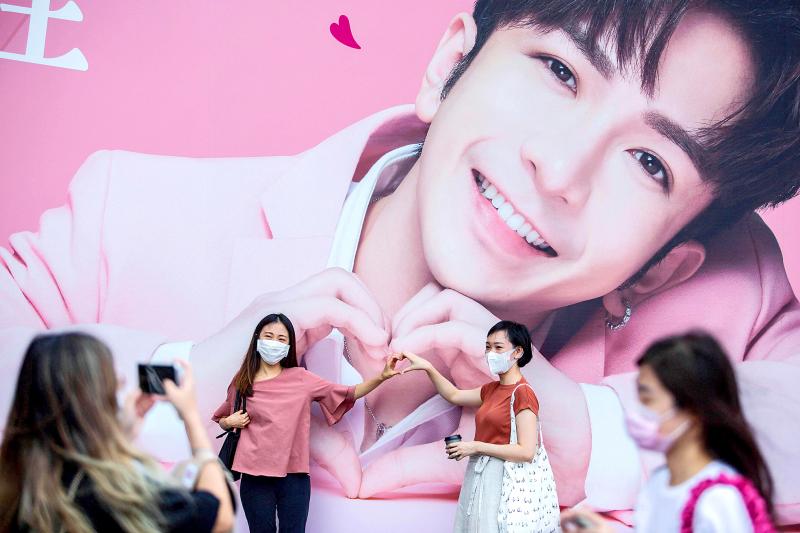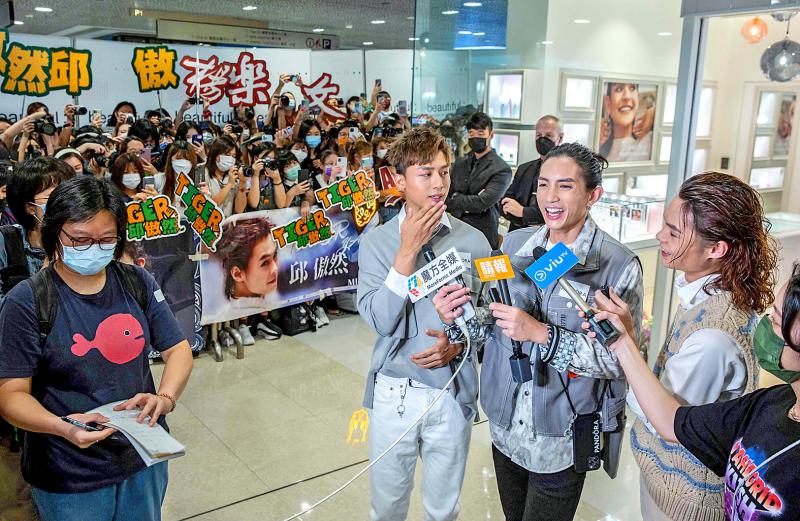In the middle of a Hong Kong shopping mall, hundreds of people are excitedly screaming and chanting. But this is not a recent democracy protest. Instead the crowd has gathered for the latest boy band frenzy sweeping the troubled city, where many are desperate for both a happy escape and a source of local pride.
The occasion is an appearance by Edan Lui (呂爵安), one of the 12 members of local band Mirror who have taken Hong Kong by storm, who has arrived to promote an animated kids’ movie screening in local theaters.
A glass-shattering scream erupts as he takes the stage and the placard-waving crowd goes wild.

Photo: AFP
Among the excitable fans was Chan Yuk-kwai, 74, who decided not to tell her daughter that she would be spending her Saturday trying to catch a glimpse of a man her grandson’s age.
Until recently, Chan admitted, Cantonese opera was about the only music she consumed — but Mirror awakened something new. She has spent months devouring what she can find about the troupe, often bombarding family chat groups with selfies when she spots a billboard featuring the band’s uniformly good-looking members.
“This upsurge is a miracle,” she beamed, contrasting the excitement of Mirror-mania with the months of depressing political and coronavirus news.

Photo: AFP
“They are my source of positive energy and happiness,” she added.
RELIEF AND BELIEF
Hong Kong has had a tough couple of years. Huge democracy protests convulsed the city in 2019, followed by a crackdown in which Beijing has swiftly moved to remodel the finance hub in its own authoritarian image.
The city has also remained closed to the outside world for most of the pandemic and has only just emerged from its worst recession in decades.
Mirror offer some much needed relief as well as belief that the city’s Cantonese culture is still thriving.
Hong Kong once used to churn out pop stars that were devoured by fans across Asia. But in the last few decades it has been overshadowed by Chinese mainland and Taiwanese pop acts singing in Mandarin, as well as the meteoric rise of South Korean K-pop.
Mirror have emerged as the most popular Cantonese pop act since the superstar male performers of the mid-1990s, dubbed the “Four Heavenly Kings” by the local press.
Their official Facebook fan page boasts 140,000 followers while a tongue-in-cheek rival page called “My Wife Married Mirror and Left My Marriage In Ruins” boasts more than double that number.
“While society is feeling suppressed, people’s awareness of supporting local things has also increased,” Melody, an administrator of Edan Lui’s fan club, said. “That drives the motivation to support a homegrown boy band.”
The band came out of a 2018 TV talent show and while many democracy supporters have embraced their upbeat lyrics the group steers well clear of showing any political colors. Public gatherings of more than four remain outlawed in Hong Kong — ostensibly to guard against the coronavirus, although the city has had no major local outbreak for more than two months.
Protests are all but illegal.
But police show little appetite for taking on Mirror’s fans.
A few hours before Lui’s mall appearance, a huge queue of fans had formed on the city’s harbor to take selfies next to a new McDonald’s advertising board featuring Mirror band member Anson Lo (盧瀚霆).
Police officers showed up, but soon moved on after advising the fans to save enough walking space for others.
Amy, a medical worker in her 40s, posed for a picture holding two cups of a special pink McDonald’s drink that Lo has endorsed.
“Many people in Hong Kong have many grievances that can’t be easily unloaded,” she said, asking to use a pseudonym.
“They gave us the ‘wow factor’ — that Hong Kong still has such great young talent.”
LOCAL PRIDE
Pride in Hong Kong’s distinct Cantonese culture and language is intimately bound up in the city’s democracy movement.
The growing “mainlandization” of Hong Kong has long fueled some of the political anger that exploded two years ago.
China’s authoritarian leaders have a long history of suppressing local identities and have vowed to make Hong Kong more “patriotic.” But there are constant signs of pushback. During the Olympics, when Hong Kong won a record six medals, there was an explosion of patriotism — not for China, but for the athletes representing the city. At one shopping mall gathering, China’s anthem was booed, triggering a police investigation.
Fellow band My Little Airport have also built a huge following through their distinctly Cantonese lyrics, peppered with local slang, as well as clear nods of sympathy to the democracy movement.
The indie group has little of the corporate backing of Mirror, but tickets to two of their upcoming performances nonetheless sold out in just minutes. Kitty Ho, a cultural commentator and recent Mirror convert, said the boy band had allowed Hong Kongers to realize they can still produce “Asia’s best” music acts.
Hong Kongers, she said, don’t need to look overseas to find musical inspiration.
“These 12 men, coming right out of us, are capable too.”

June 2 to June 8 Taiwan’s woodcutters believe that if they see even one speck of red in their cooked rice, no matter how small, an accident is going to happen. Peng Chin-tian (彭錦田) swears that this has proven to be true at every stop during his decades-long career in the logging industry. Along with mining, timber harvesting was once considered the most dangerous profession in Taiwan. Not only were mishaps common during all stages of processing, it was difficult to transport the injured to get medical treatment. Many died during the arduous journey. Peng recounts some of his accidents in

“Why does Taiwan identity decline?”a group of researchers lead by University of Nevada political scientist Austin Wang (王宏恩) asked in a recent paper. After all, it is not difficult to explain the rise in Taiwanese identity after the early 1990s. But no model predicted its decline during the 2016-2018 period, they say. After testing various alternative explanations, Wang et al argue that the fall-off in Taiwanese identity during that period is related to voter hedging based on the performance of the Democratic Progressive Party (DPP). Since the DPP is perceived as the guardian of Taiwan identity, when it performs well,

The Taiwan People’s Party (TPP) on May 18 held a rally in Taichung to mark the anniversary of President William Lai’s (賴清德) inauguration on May 20. The title of the rally could be loosely translated to “May 18 recall fraudulent goods” (518退貨ㄌㄨㄚˋ!). Unlike in English, where the terms are the same, “recall” (退貨) in this context refers to product recalls due to damaged, defective or fraudulent merchandise, not the political recalls (罷免) currently dominating the headlines. I attended the rally to determine if the impression was correct that the TPP under party Chairman Huang Kuo-Chang (黃國昌) had little of a

At Computex 2025, Nvidia CEO Jensen Huang (黃仁勳) urged the government to subsidize AI. “All schools in Taiwan must integrate AI into their curricula,” he declared. A few months earlier, he said, “If I were a student today, I’d immediately start using tools like ChatGPT, Gemini Pro and Grok to learn, write and accelerate my thinking.” Huang sees the AI-bullet train leaving the station. And as one of its drivers, he’s worried about youth not getting on board — bad for their careers, and bad for his workforce. As a semiconductor supply-chain powerhouse and AI hub wannabe, Taiwan is seeing